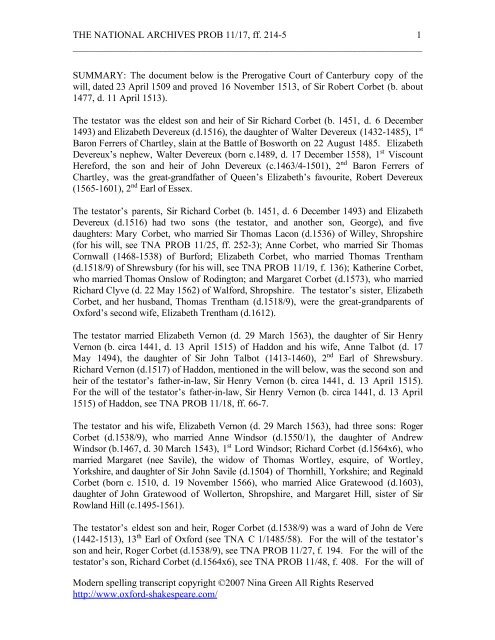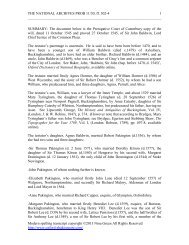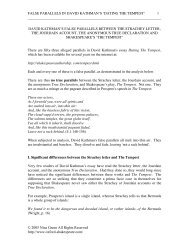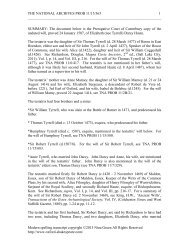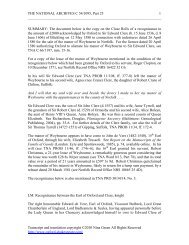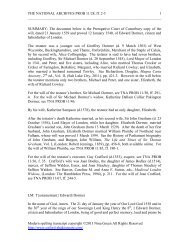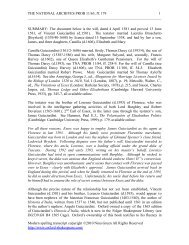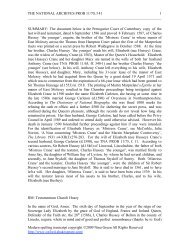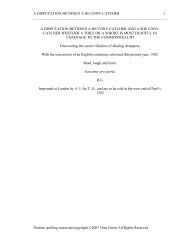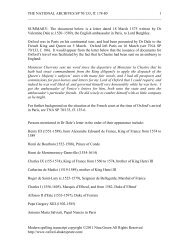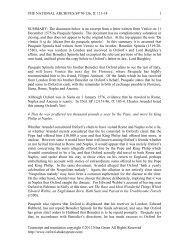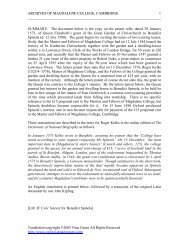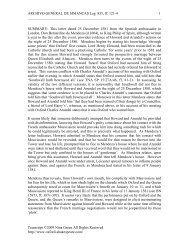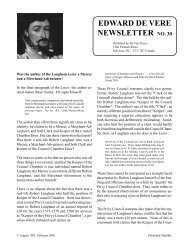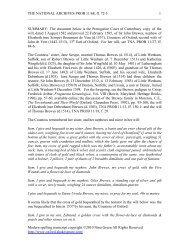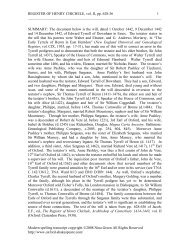Create successful ePaper yourself
Turn your PDF publications into a flip-book with our unique Google optimized e-Paper software.
THE NATIONAL ARCHIVES <strong>PROB</strong> <strong>11</strong>/<strong>17</strong>, <strong>ff</strong>. <strong>214</strong>-5 1<br />
________________________________________________________________________<br />
SUMMARY: The document below is the Prerogative Court of Canterbury copy of the<br />
will, dated 23 April 1509 and proved 16 November 1513, of Sir Robert Corbet (b. about<br />
1477, d. <strong>11</strong> April 1513).<br />
The testator was the eldest son and heir of Sir Richard Corbet (b. 1451, d. 6 December<br />
1493) and Elizabeth Devereux (d.1516), the daughter of Walter Devereux (1432-1485), 1 st<br />
Baron Ferrers of Chartley, slain at the Battle of Bosworth on 22 August 1485. Elizabeth<br />
Devereux’s nephew, Walter Devereux (born c.1489, d. <strong>17</strong> December 1558), 1 st Viscount<br />
Hereford, the son and heir of John Devereux (c.1463/4-1501), 2 nd Baron Ferrers of<br />
Chartley, was the great-grandfather of Queen’s Elizabeth’s favourite, Robert Devereux<br />
(1565-1601), 2 nd Earl of Essex.<br />
The testator’s parents, Sir Richard Corbet (b. 1451, d. 6 December 1493) and Elizabeth<br />
Devereux (d.1516) had two sons (the testator, and another son, George), and five<br />
daughters: Mary Corbet, who married Sir Thomas Lacon (d.1536) of Willey, Shropshire<br />
(for his will, see <strong>TNA</strong> <strong>PROB</strong> <strong>11</strong>/25, <strong>ff</strong>. 252-3); Anne Corbet, who married Sir Thomas<br />
Cornwall (1468-1538) of Burford; Elizabeth Corbet, who married Thomas Trentham<br />
(d.1518/9) of Shrewsbury (for his will, see <strong>TNA</strong> <strong>PROB</strong> <strong>11</strong>/19, f. 136); Katherine Corbet,<br />
who married Thomas Onslow of Rodington; and Margaret Corbet (d.1573), who married<br />
Richard Clyve (d. 22 May 1562) of Walford, Shropshire. The testator’s sister, Elizabeth<br />
Corbet, and her husband, Thomas Trentham (d.1518/9), were the great-grandparents of<br />
Oxford’s second wife, Elizabeth Trentham (d.1612).<br />
The testator married Elizabeth Vernon (d. 29 March 1563), the daughter of Sir Henry<br />
Vernon (b. circa 1441, d. 13 April 1515) of Haddon and his wife, Anne Talbot (d. <strong>17</strong><br />
May 1494), the daughter of Sir John Talbot (1413-1460), 2 nd Earl of Shrewsbury.<br />
Richard Vernon (d.15<strong>17</strong>) of Haddon, mentioned in the will below, was the second son and<br />
heir of the testator’s father-in-law, Sir Henry Vernon (b. circa 1441, d. 13 April 1515).<br />
For the will of the testator’s father-in-law, Sir Henry Vernon (b. circa 1441, d. 13 April<br />
1515) of Haddon, see <strong>TNA</strong> <strong>PROB</strong> <strong>11</strong>/18, <strong>ff</strong>. 66-7.<br />
The testator and his wife, Elizabeth Vernon (d. 29 March 1563), had three sons: Roger<br />
Corbet (d.1538/9), who married Anne Windsor (d.1550/1), the daughter of Andrew<br />
Windsor (b.1467, d. 30 March 1543), 1 st Lord Windsor; Richard Corbet (d.1564x6), who<br />
married Margaret (nee Savile), the widow of Thomas Wortley, esquire, of Wortley,<br />
Yorkshire, and daughter of Sir John Savile (d.1504) of Thornhill, Yorkshire; and Reginald<br />
Corbet (born c. 1510, d. 19 November 1566), who married Alice Gratewood (d.1603),<br />
daughter of John Gratewood of Wollerton, Shropshire, and Margaret Hill, sister of Sir<br />
Rowland Hill (c.1495-1561).<br />
The testator’s eldest son and heir, Roger Corbet (d.1538/9) was a ward of John de Vere<br />
(1442-1513), 13 th Earl of Oxford (see <strong>TNA</strong> C 1/1485/58). For the will of the testator’s<br />
son and heir, Roger Corbet (d.1538/9), see <strong>TNA</strong> <strong>PROB</strong> <strong>11</strong>/27, f. 194. For the will of the<br />
testator’s son, Richard Corbet (d.1564x6), see <strong>TNA</strong> <strong>PROB</strong> <strong>11</strong>/48, f. 408. For the will of<br />
Modern spelling transcript copyright ©2007 Nina Green All Rights Reserved<br />
http://www.oxford-shakespeare.com/
THE NATIONAL ARCHIVES <strong>PROB</strong> <strong>11</strong>/<strong>17</strong>, <strong>ff</strong>. <strong>214</strong>-5 2<br />
________________________________________________________________________<br />
the testator’s son, Reginald Corbet (born c. 1510, d. 19 November 1566), see <strong>TNA</strong><br />
<strong>PROB</strong> <strong>11</strong>/49.<br />
The testator and his wife, Elizabeth Vernon (d. 29 March 1563), also had four daughters:<br />
Jane, who married Thomas Lee (d.1561/2), the son and heir of Fulke Lee and Alice, the<br />
daughter of Sir Richard Cornwall of Berrington, Herefordshire (for the will of Thomas<br />
Lee, see <strong>TNA</strong> <strong>PROB</strong> <strong>11</strong>/46, <strong>ff</strong>. 23-4); Joan or Anne, who married Thomas Newport<br />
(d.1548x51); Mary, who married Thomas Powell of Oswestry, and Dorothy, who<br />
married Sir Richard Mainwaring (b. about 1499, d. 30 September 1558) of Ightfield,<br />
Shropshire.<br />
The testator’s daughter, Joan or Anne Corbet, and her husband, Thomas Newport<br />
(d.1548/51), were the parents of Sir Richard Newport (d.1570/1), the owner of a copy of<br />
Hall’s Chronicle in the British Library containing annotations thought to have been made<br />
by Shakespeare. For the will of Thomas Newport (d.1548/51), see <strong>TNA</strong> <strong>PROB</strong> <strong>11</strong>/34, f.<br />
<strong>11</strong>2. For the will of Sir Richard Newport (d.1570/1), see <strong>TNA</strong> <strong>PROB</strong> <strong>11</strong>/53, f. 290.<br />
George Bromley (d.1545), appointed as one of the testator’s executors, was George<br />
Bromley (d.1545) of Hodnet, Shropshire, who married Jane Lacon (b. about 1505), one of<br />
the daughters of Mary Corbet and Sir Thomas Lacon (d.1536). George Bromley (d.1545)<br />
was a first cousin of Margaret Bromley, the wife of Sir Richard Newport (d.1570/1),<br />
owner of the annotated copy of Hall’s Chronicle mentioned above. George Bromley<br />
(d.1545) and Jane Lacon (b. about 1505) were the parents of Queen Elizabeth’s Lord<br />
Chancellor, Sir Thomas Bromley (c.1530–1587), who was a trustee of Oxford’s indenture<br />
entered into on 30 January 1575 prior to his departure for his continental tour (see ERO<br />
D/DRg2/25).<br />
The testator’s sister, Mary Corbet, and Sir Thomas Lacon (d.1536) had another daughter,<br />
Mary Lacon (d.1563), who married firstly, Thomas Acton (d.1546) of Sutton,<br />
Worcestershire, and by him had two sons, Lancelot and Gabriel, who died in infancy, and<br />
a daughter, Joyce Acton (1532-1595), who married Sir Thomas Lucy (b. in or before<br />
1532, d. 1600) of Charlecote, famous for Shaksper of Stratford’s alleged poaching of deer<br />
from his park. From the entry for Sir Thomas Lucy (b. in or before 1532, d. 1600) of<br />
Charlecote in the online edition of The Dictionary of National Biography:<br />
Thomas Lucy was educated at home, at one time by John Fawkener, an Oxford graduate,<br />
and then, for a year or so between the summer of 1545 and early in 1547, by John Foxe,<br />
the martyrologist. During this period Thomas, still only fourteen or so, was betrothed to<br />
Joyce (1532–1595), the twelve-year-old only child and heir of Thomas Acton of Sutton<br />
Park, in Worcestershire. Their marriage settlement is dated 1 August 1546, the marriage<br />
itself presumably taking place shortly afterwards. Five months later, in January 1547,<br />
Acton died, and his extensive estates, subject only to his wife's dowry, were thus inherited<br />
by his daughter.<br />
Modern spelling transcript copyright ©2007 Nina Green All Rights Reserved<br />
http://www.oxford-shakespeare.com/
THE NATIONAL ARCHIVES <strong>PROB</strong> <strong>11</strong>/<strong>17</strong>, <strong>ff</strong>. <strong>214</strong>-5 3<br />
________________________________________________________________________<br />
Thomas Lucy might not now be so well known had his name not come to be associated<br />
with one of the earliest examples of Shakespeare folklore. Nicholas Rowe was the first to<br />
publish this, in <strong>17</strong>09 and in some detail, but similar stories can be found in three other<br />
autonomous sources of late seventeenth-century date, all ultimately derived, no doubt,<br />
from local Stratford gossip. Rowe's account records that the young William Shakespeare,<br />
having got into bad company, had more than once stolen deer from Thomas Lucy's park<br />
at Charlecote, that he had been caught and rather too severely punished, and that in<br />
revenge had composed a ballad satirizing Lucy, which got him into such trouble that he<br />
had to leave Stratford for London. Another version of the story introduces the concept that<br />
Shakespeare's revenge included a caricature of Lucy in the person of Justice Shallow.<br />
Further embellished, this has proved to be one of the most popular and enduring<br />
Shakespeare legends, and has provoked much debate as to its authenticity. Some writers<br />
have drawn attention to inconsistencies (there was, for example, no formal park at<br />
Charlecote at this date), and few claim that the story can be true throughout. Nevertheless,<br />
during Shakespeare's youth Thomas Lucy was certainly well known in Stratford.<br />
After the death of Thomas Acton (d.1546), Mary Lacon (d.1563) married George Vernon<br />
(d.1554/5) of Hodnet, who, by his first wife, Elizabeth Pigot, was the father of John<br />
Vernon (d.1592), the father of Elizabeth Vernon (b. <strong>11</strong> January 1573, d. after 1655), who<br />
married Henry Wriothesley (1573–1624), 3 rd Earl of Southampton. For the will of Mary<br />
Lacon Acton Vernon (d.1563), see <strong>TNA</strong> <strong>PROB</strong> <strong>11</strong>/46, <strong>ff</strong>. 157-8. For the will of George<br />
Vernon (d.1554/5) of Hodnet, see <strong>TNA</strong> <strong>PROB</strong> <strong>11</strong>/37, f. 129.<br />
For the foregoing see Richardson, Douglas, Plantagenet Ancestry (Baltimore: Genealogical<br />
Publishing, pp. 310, 473-4, 485, 705; Corbet, Augusta Elizabeth, The Family of Corbet,<br />
Vol. II (London: St. Catherine’s Press, n.d.), pp. 253,258, 263-97, available online; the<br />
pedigree of Corbet in Burke, John, A Genealogical and Heraldic History of the<br />
Commoners, Vol. III (London: Henry Colburn, 1838), pp. 189-90; the pedigree of Savile<br />
of Thornhill in Foster, Joseph, Pedigrees of the County Families of Yorkshire, Vol. II<br />
(London: W. Wilfred Head, 1874), available online; The Savile Family at<br />
http://www.medievalgenealogy.org.uk/sources/saville/clay2.shtml; the pedigree of Clyve<br />
in Jewitt, Llewellynn, ed., The Reliquary, Vol. VI, 1865-6 (London: Bemrose & Sons), p.<br />
27; the will of Margaret (nee Corbet) Clyve (d.1573), <strong>TNA</strong> <strong>PROB</strong> <strong>11</strong>/55, <strong>ff</strong>. 251-2; the<br />
pedigree of Lee in Transactions of the Shropshire Archaeological and Natural History<br />
Society, Vol. V, (Shrewsbury: Adnitt and Naunton, 1882), pp. 374-9, available online; and<br />
the entries in the online edition of The Dictionary of National Biography for the Vernon<br />
family; Walter Devereux (1432-1485), 1 st Baron Ferrers of Chartley; Walter Devereux<br />
(born c.1489, d. <strong>17</strong> December 1558), 1 st Viscount Hereford; Walter Devereux (1539-<br />
1576), 1 st Earl of Essex; Reginald Corbet (born c.1510, d. 19 November 1566), Sir Thomas<br />
Bromley (c.1530–1587); and Sir Rowland Hill (c.1495-1561).<br />
LM: Testamentum domini Roberti Corbet Militis<br />
Modern spelling transcript copyright ©2007 Nina Green All Rights Reserved<br />
http://www.oxford-shakespeare.com/
THE NATIONAL ARCHIVES <strong>PROB</strong> <strong>11</strong>/<strong>17</strong>, <strong>ff</strong>. <strong>214</strong>-5 4<br />
________________________________________________________________________<br />
In the name of God, Amen. Whereas I, Sir Robert Corbet, knight, have made a feo<strong>ff</strong>ment<br />
by deed unto Sir Henry Vernon, knight, Thomas Englefield, knight, Thomas Cornwall,<br />
knight, Thomas Lacon, esquire, Roger Corbet, my son and heir apparent, esquire, Richard<br />
Vernon, esquire, Roger Thornes, esquire and George Onslowe of all and singular my<br />
lordships, manors, meses, lands and tenements, rents, reversions and fines and all other<br />
hereditaments with th’ appurtenances in Hopton, Fitz, Eaton Constantine, Lawley,<br />
Waters Upton, Dallington, Linslade, Southcote(?), Howbridge Hill and Wigginton within<br />
the county of Salop, Northampton, Buckingham, Essex and Hertford, to have and to hold<br />
to them, their heirs and assigns, to the use of me, the foresaid Sir Robert, and of mine<br />
heirs, to fulfil my last will made or hereafter to be made, know ye, me, the said Sir Robert,<br />
whole of remembrance and perfect mind, thanked be God, make, ordain and declare my<br />
last will and testament in manner and form following:<br />
First, I bequeath my soul to God Almighty and to his Blessed Mother, Saint Mary, and<br />
to all the holy company of heaven, and my body to be buried in the church of Saint<br />
Bartholomew at Moreton Corbet, if it please God I decease there, and if it happen me by<br />
the pleasure of God to decease in any other place, then I commit my body to be buried in<br />
such a holy place as mine executors think most meetliest and convenient;<br />
Also I will that my said executors prepare and ordain for meat, drink, light and all other<br />
things necessary and belonging for me at the time of my burying as they think convenient<br />
and according after their discretion;<br />
Item, I will that my said executors see my dirges and Masses be songen and said with<br />
secular priests, clerks and religious men at the same time as they shall think most<br />
expedient and profitable for my soul health;<br />
Item, I will that my said executors cause my trentals and 30 Masses, every of them, to be<br />
songen and said with secular priests, clerks and religious men at the day of my said<br />
burying if they so may have priests to do it, and if they may not, then to see it be done as<br />
shortly after as they conveniently can have time;<br />
Item, I will have that my said executors, in as short time as they can conveniently after<br />
my burying, prepare and ordain the Great Trental of Saint Gregory to be sung, said and<br />
done in due form and order as it ought to be for my soul and all Christian [+souls];<br />
Item, I will that every secular priest, clerk and religious man be rewarded for their divine<br />
service saying and doing at the time of my said burying after the laudable custom thereto<br />
belonging and the discretion of my executors;<br />
Item, I will that my said executors provide and hire two honest and conveniable priests,<br />
such as shall be of good name and fame, to song and say dirge Masses and other devout<br />
prayers by the space of 2 whole years next following the day of my said burying, to pray<br />
for my soul and all Christian souls in manner and form following, that is to say, every<br />
Monday during the said 2 years, every of them to say Masses of the Trinity, Dirge and<br />
Modern spelling transcript copyright ©2007 Nina Green All Rights Reserved<br />
http://www.oxford-shakespeare.com/
THE NATIONAL ARCHIVES <strong>PROB</strong> <strong>11</strong>/<strong>17</strong>, <strong>ff</strong>. <strong>214</strong>-5 5<br />
________________________________________________________________________<br />
Commendations; every Tuesday, Mass of the Holy Ghost and Our Lady[’s] Psalter;<br />
every Wednesday, Mass of Requiem, Dirge and Commendations; every Thursday, Mass<br />
of the 5 Wounds, 7 Psalms and Litany; every Friday, Mass of John(?), Dirge and<br />
Commendations; every Saturday, Mass of Our Lady and Our Lady[’s] Psalter; and every<br />
of the said priests to have 8 marks for their hire or more after as they be hired;<br />
Item, I bequeath to Roger, my son and heir, my best salt with the covering, my best piece<br />
of silver with the covering, my best goblet and half my spoons, and all the residue of my<br />
said plate I bequeath to Elizabeth, my wife, during her life, and after her decease to remain<br />
to Roger, my said son;<br />
Item, I bequeath half my stu<strong>ff</strong> of household and half my cattle to Roger, my said son, and<br />
the other half to Elizabeth, my wife;<br />
Item, I will that my wearing gear and all other things not bequeathed stand at my pleasure<br />
till my departing to give, do with and bequeath where I or my executors shall think most<br />
best and convenient;<br />
Item, I will that my said feo<strong>ff</strong>ees or the overlivers of them and their heirs shall stand and<br />
be seised of and in the said lordships, manors, meses, lands, tenements and all other<br />
hereditaments above-rehearsed to th’ intent they shall su<strong>ff</strong>er mine executors to take,<br />
receive and levy th’ issues and profits of all the said lordships, manors, meses, lands and<br />
tenements and all other hereditaments with th’ appurtenances and every parcel of them to<br />
pay my debts and all other things pertaining to my interment and soul health in manner<br />
and form abovesaid, and after that done, I will that my said executors with the yearly<br />
profits and issues aforesaid content, pay and bestow to and for the marriage of every of<br />
my daughters, that is to say, Anne, Dorothy and Jane, the sum of 100 marks and their<br />
arrayment, which sums, after my debts paid, shall be received to the use and form<br />
following, that is to say, that every of my said daughters shall have yearly a portion of<br />
the said issues and profits of the said lordships, manors, meses, lands and tenements with<br />
their appurtenances till her said sum and bequest be fully content and paid;<br />
Also I will that my said daughters and every of them have su<strong>ff</strong>icient finding of meat, drink<br />
and cloth convenient and meetly for them, over and beside their portion of 100 marks<br />
apiece and their arrayment abovesaid for their marriage, till they be married, and at such<br />
time as any of them shall be married, she that so shall be married shall have her portion if<br />
it be levied, or as much as is levied, and her arrayment, and no further finding, and that<br />
sum of her portion that is not paid at the time of her marriage to be paid in manner and<br />
form abovesaid;<br />
Item, I will that my executors content and pay to and for the marriage of Margaret, my<br />
sister, the sum of 40 marks and her arrayment of the yearly issues and profits abovesaid,<br />
and her finding of meat, drink and arrayment till she be married upon the same issues and<br />
profits beside her said bequest;<br />
Modern spelling transcript copyright ©2007 Nina Green All Rights Reserved<br />
http://www.oxford-shakespeare.com/
THE NATIONAL ARCHIVES <strong>PROB</strong> <strong>11</strong>/<strong>17</strong>, <strong>ff</strong>. <strong>214</strong>-5 6<br />
________________________________________________________________________<br />
Item, I will that my said feo<strong>ff</strong>ees or the overlivers of them, after my debts paid and my<br />
will and testament in everything accomplished and fulfilled, make an estate of all the said<br />
lordships, manors, meses, lands and tenements and all other hereditaments with th’<br />
appurtenances abovesaid unto Roger Corbet, my son and heir, and to the heirs of his<br />
body lawfully begotten, and for lack of such issue, the remainder to my right heirs;<br />
Item, I make and ordain Thomas Cornwall, knight, Thomas [ ], esquire, Elizabeth, my<br />
wife, George Bromley and George Onslowe my executors, and Henry Vernon, knight, and<br />
Richard Vernon, his son and heir, overseers;<br />
In witness whereof to this my present will and testament I have put to my seal and sign<br />
manual the 23 rd day of April in the year of our Lord God 1509, and of the reign of our<br />
Sovereign Lord King Henry the 7 th after the conquest of England the 24 th .<br />
Probatum fuit suprascriptum testamentum coram domino Apud Lamhith xvj die Mensis<br />
Nouembris Anno domini Millesimo quingentesimo terciodecimo habentis dum vixit et<br />
mortis suo tempore bona siue debita in diuersis Diocesis sive(?) provincijs Cantuariensis<br />
Iuramento Domine Elizabethe Relicte et Executricis in huiusmodi testamento nominate in<br />
persona Willelmi Cromwell procuratoris sui in hac parte su<strong>ff</strong>icienter et legitime constituti<br />
Ac approbatum et insinuatum Et commissa fuit Administracio omnium et singulorum<br />
bonorum et debitorum dicti defuncti prefate Executrici de bene et fideliter Administrando<br />
eadem Ac de pleno et fideli Inuentario &c citra festum Natalis domini proximum futurum<br />
&c Necnon de plano et vero compoto &c Reddendo Ad sancta dei Euangelia Iurate Alijs<br />
Executoribus onus execucionis testamenti eiusdem expresse refutarunt<br />
[=The above-written testament was proved before the Lord [+Archbishop?] at Lambeth<br />
on the 16 th day of the month of November in the year of the Lord the thousand five<br />
hundred thirteenth, having while he lived and at the time of his death goods or debts in<br />
divers dioceses or provinces of Canterbury, by the oath of Lady Elizabeth, relict and<br />
executrix appointed in the same testament, in the person of William Cromwell, her<br />
proctor su<strong>ff</strong>iciently and lawfully constituted in that respect, and probated and registered,<br />
and administration was granted of all and singular the goods and debts of the said deceased<br />
to the forenamed executrix, sworn on the Holy Gospels to well and faithfully administer<br />
the same, and a full and true inventory etc. before the feast of the Birth of the Lord next<br />
to come etc., and also to render a plain and true account etc., the other executors having<br />
expressly refused the burden of the execution of the same testament.]<br />
Modern spelling transcript copyright ©2007 Nina Green All Rights Reserved<br />
http://www.oxford-shakespeare.com/


